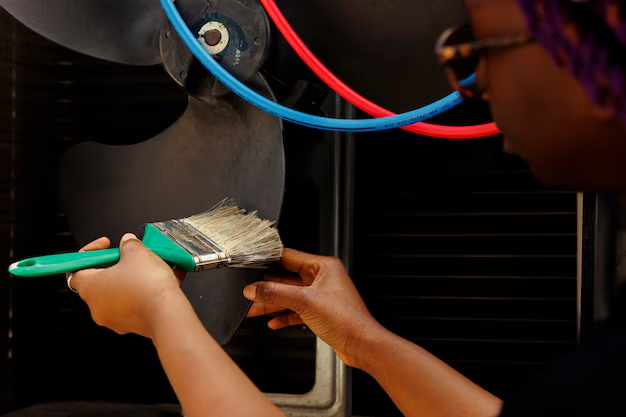Is Your Refrigerator Compressor Repairable? A Comprehensive Guide to Understanding and Troubleshooting
When your refrigerator starts acting up, it's easy to hit the panic button. After all, it's one of those essential home appliances you rely on daily. If food suddenly starts warming up or odd noises emanate from your fridge, the compressor could be the culprit. But can a refrigerator compressor be repaired, or is replacement the only solution? Dive into this detailed guide to explore everything about refrigerator compressors, including whether repair is feasible, the signs of a faulty compressor, and practical steps to address common issues.
🤔 Understanding the Role of a Refrigerator Compressor
What Does the Compressor Do?
At the heart of every refrigerator is the compressor, an integral component responsible for circulating refrigerant throughout the system. Acting like the appliance's engine, the compressor compresses refrigerant, raising its temperature, and propelling it through the coils to cool down and convert back to liquid form. This cyclical process keeps the refrigerator cool, preserving your food items.
Why Compressors Fail
Despite their durability, compressors are not immune to issues. Common reasons for compressor failure include:
- Wear and tear: Over time, mechanical parts can degrade.
- Electrical failures: Power surges or faulty wiring can damage the compressor.
- Refrigerant leaks: A loss in refrigerant can overwork the compressor, leading to overheating or failure.
- Blockages: Debris or ice accumulation can impede compressor functionality.
🔍 Identifying a Faulty Compressor: Signs to Watch For
Before diving into repairs, determining whether the compressor is indeed the problem is crucial. Here are some signs that might indicate a malfunction:
- Warm fridge and freezer: A rise in temperature could suggest the compressor isn't circulating refrigerant effectively.
- Unusual noises: Clicking, humming, or knocking noises from the back of the fridge often signal compressor issues.
- Compressor continuously running: Unlike the typical on-off cycling, if it's running continuously, there could be a problem.
- Frost build-up: Excess frost in the freezer can mean inefficient compressor operation.
🔧 Repair vs. Replace: What are Your Options?
Can You Repair It?
In many cases, a professional technician can repair a refrigerator compressor. The exact course of action depends on the damage extent and component condition. Basic repairs might involve:
- Replacing start relays or capacitors.
- Fixing electrical connections.
- Sealing minor refrigerant leaks and recharging refrigerant.
However, major internal failures might necessitate full compressor replacement. Always weigh the repair costs against buying a new unit.
When to Consider Replacement
If repair costs are significant or the fridge is older, it might be more economical to replace the compressor or the entire fridge. Compressors can often be a high-ticket item in repairs, and investing in a new appliance may provide better energy efficiency and advanced features.
🛠️ DIY Troubleshooting: Steps to Handle Minor Issues
Safety First!
Before attempting any repairs, ensure you take safety precautions:
- Unplug the fridge: Always disconnect from the power source.
- Allow cooling time: Ensure the compressor is cool to the touch.
Step-by-Step Troubleshooting
- Check power source: Confirm the fridge is plugged in and that the outlet functions correctly.
- Inspect temperature settings: Ensure thermostat settings are ideal for cooling.
- Examine door seals: Poor seals can overwork compressors by letting warm air in.
- Clean condenser coils: Dust and debris can hinder efficiency; vacuum regularly.
- Verify start relay condition: A burnt or faulty relay can prevent compressor start.
DIY Fixes for Minor Issues
- Sealed System Repairs: Tackle small refrigerant leaks with a refrigerant recharge kit.
- Replace Start Components: Swap out defective starter relays or capacitors.
While these steps can address minor faults, seeking professional help is advisable for complex issues.
📋 Crucial Tips & Takeaways
- 👨🔧 Call a Professional: For significant issues, a certified technician is your best bet.
- 🔄 Weigh Your Options: Consider repair costs vs. replacement efficiency.
- 🕒 Regular Maintenance: Preventive care can extend your fridge’s lifespan.
- 💡 Know Your Appliance: Understanding make and model can streamline repair parts and service.
🤗 Additional Considerations: Longevity & Care Tips
Prolonging Compressor Life
Regular maintenance can help prolong the life of your refrigerator compressor:
- Quarterly cleaning: Dust condenser coils every three months for optimal heat exchange.
- Door seal checks: Periodically inspect gaskets for wear and replace if necessary.
- Balance your load: Avoid overloading to ensure air circulation and efficient operation.
Energy Efficiency & Environment
Opting for an energy-efficient model can reduce long-term electricity costs and environmental impact. Units with high energy ratings can deliver cost savings and minimized carbon footprint.
📝 Summary Table: Quick Reference
| Task/Issue | DIY Consideration | Professional Help Needed |
|---|---|---|
| Power Issue | Check outlet & reset | Electrical diagnosis |
| Noise Issue | Inspect fan & level fridge | Internal component check |
| Temperature Issue | Adjust thermostat & seals | Refrigerant system issues |
| Compressor Stays On | Verify relay/capacitor | Motor or circuitry faults |
Remember: Always prioritize safety when attempting any form of appliance repair. When in doubt, rely on professional expertise to avoid exacerbating issues.
By understanding the ins and outs of your refrigerator compressor and knowing when to seek assistance, you ensure reliable appliance performance and longer life for your kitchen essential.

